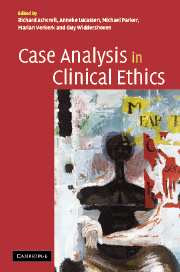Book contents
- Frontmatter
- Contents
- Notes on contributors
- Acknowledgements
- 1 Philosophical introduction: case analysis in clinical ethics
- 2 Families and genetic testing: the case of Jane and Phyllis
- 3 Family access to shared genetic information: an analysis of the narrative
- 4 A virtue-ethics approach
- 5 Interpretation and dialogue in hermeneutic ethics
- 6 ‘Power, corruption and lies’: ethics and power
- 7 Reading the genes
- 8 A utilitarian approach
- 9 A feminist care-ethics approach to genetics
- 10 A conversational approach to the ethics of genetic testing
- 11 Families and genetic testing: the case of Jane and Phyllis from a four-principles perspective
- 12 A phenomenological approach to bioethics
- 13 An empirical approach
- 14 Response to ethical dissections of the case
- 15 Philosophical reflections
- Index
- References
13 - An empirical approach
Published online by Cambridge University Press: 01 September 2009
- Frontmatter
- Contents
- Notes on contributors
- Acknowledgements
- 1 Philosophical introduction: case analysis in clinical ethics
- 2 Families and genetic testing: the case of Jane and Phyllis
- 3 Family access to shared genetic information: an analysis of the narrative
- 4 A virtue-ethics approach
- 5 Interpretation and dialogue in hermeneutic ethics
- 6 ‘Power, corruption and lies’: ethics and power
- 7 Reading the genes
- 8 A utilitarian approach
- 9 A feminist care-ethics approach to genetics
- 10 A conversational approach to the ethics of genetic testing
- 11 Families and genetic testing: the case of Jane and Phyllis from a four-principles perspective
- 12 A phenomenological approach to bioethics
- 13 An empirical approach
- 14 Response to ethical dissections of the case
- 15 Philosophical reflections
- Index
- References
Summary
In the analysis of most problems in bioethics, knowledge about the state of the world and our abilities to intervene in it play a significant role. Many ethical problems only emerge when our ability to intervene in the world increases, and it is often important to know in some detail what is possible and what is not. In our ethical arguments we can therefore often discern premises of two kinds: ethical premises and empirical premises.
This means that valid ethical arguments can become false if either of these two kinds of premises is false. If I, for instance, base my analysis of the ethics of communication with persons with terminal illness on the empirical premise that most people who are told that they are terminally ill will become severely depressed and will never recover from their depression, I may well reach a quite different ethical conclusion than if I base the analysis on the premise that such depression is neither widespread nor permanent.
We can further subdivide empirical premises into three groups, each answering a different kind of ethically relevant question:
What is the state of the world?
What are our possibilities of intervening in the world?
What are the consequences of our interventions?
The first task of an empirical approach to bioethics is therefore to identify the explicit and implicit/enthymematic empirical premises in ethical arguments and try to find out whether they are supported by research findings and theories in the relevant scientific fields.
- Type
- Chapter
- Information
- Case Analysis in Clinical Ethics , pp. 201 - 212Publisher: Cambridge University PressPrint publication year: 2005
References
- 2
- Cited by



